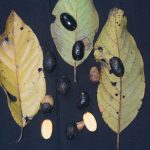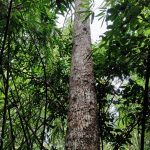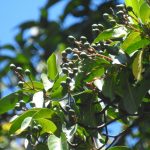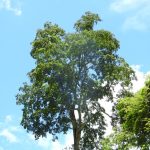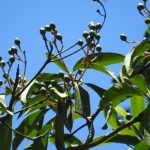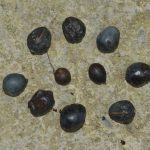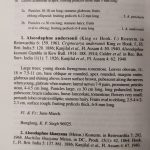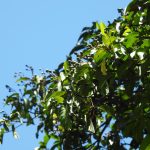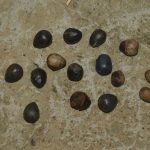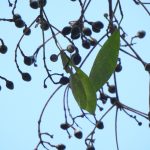Sarcosperma arboreum Hook.f., Gen. Pl. 2: 655 1876. (syn: Sideroxylon arboreum Buch.-Ham. ex C.B.Clarke, pro syn.);
.
Sikkim to S. China: Assam, Bangladesh, China South-Central, China Southeast, East Himalaya, Myanmar, Thailand as per POWO;
.
MS,May,2015/03 Mchilus sp.(Lauraceae) for ID : 2 posts by 2 authors. Attachments (2)
Altitude : 600 – 1,500 m.
Date : 11/02/2007 (Flowers) and 08/06/2007 (Fruits)
Habit : Middle-sized evergreen tree with scented flowers.
Habitat : Wild
Machilus species in eFIoraofindia (with details/ keys from published papers/ regional floras/ FRLHT/ FOI/ efloras/ books etc., where ever available)
Same as in Machilus sp. for ID
May I request you to pl. post a high resolution image of Thingbuhchang (2).JPG, to check with the keys.
Kindly have a look.
The fruits are not eaten by humans, but are eaten by wild animals like bears, palm civets, etc. Some white latex is coming out from unripe fruits, etc. ?
Sarcosperma arboreum ?
Thanks, …, What are the species reported and what are the keys?
Sarcosperma arboreum is recorded in Mizoram
Thanks, … What about Sacrosperma griffithii ? Is it reported ?
No
My one specimen was identified as S.griffithii at National Herbarium, Howrah, but this identification was wrong, I think
Yes, it should be Sarcosperma arboreum as I can see glandular pits the axils of abxial surface as in GBIF specimen as per keys from Flora of China:
| 2 (1) | Leaf blade abaxially with glandular pits in axils of most main lateral veins | 2 Sarcosperma arboreum | |
| + | Leaves without glandular pits. | (3) | |
| 3 (2) | Leaf blade lanceolate, (1.5–)2–4(–5.5) cm wide | 3 Sarcosperma griffithii | |
| + | Leaf blade obovate to oblanceolate, 3–6 cm wide | 4 Sarcosperma laurinum |
MS, Jan.,2021/08 Lauraceae fam. for id
3 images.
Location : Dilkhan, Mizoram
Date : 10-01-3021
Habit : Large tree
Habitat : Wild
Difficult to say without seeing the arrangement of the fruits.
Is Sarcosperma a possibility?
Some possibility is there for Sarcosperma arboreum as per Hong Kong herbarium & GBIF– specimen 1 and specimen 2
But difficult to confirm with these images.
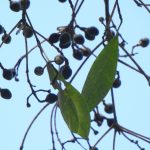
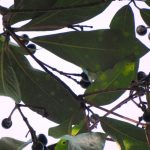
MS Oct,2021/30 Lauraceae ? for id: 6 images- 1 high res.
Location : Ailawng
Date : 16-08-2018
Habit : Large tree
Habitat : Wild
Looks so !
Any idea about the genus of this Lauraceae (?) member?
This is Alseodaphne. I do not know the species.
Maybe Persea… kindly also check Persea kingii
Persea is a new world genus. All the Asian members of Persea belong to Machilus.
To me appears to be the same as in earlier observations at Sarcosperma arboreum
Isn’t ?
I think, it’s different species.
Looks different from Machilus kingii as per GBIF specimens- one and two, due to persistent calyx.
What are the species of Alseodaphne listed in your book?
Pl. also post high res. images, to check the details.
Looking at the fruiting calyx, I still feel it is Sarcosperma arboreum only as per GBIF specimen.
.
References: POWO Catalogue of Life The Plant List Ver.1.1 WCSP IPNI Hong Kong herbarium GBIF– specimen 1 specimen 2 (High resolution specimens) Flora of China FOC illustration India Biodiversity Portal IBIS Flora (FBI- Sarcosperma arboreum Buch-Ham ex C.B.Clarke)

.jpg?part=0.1&view=1&vt=ANaJVrFWsQPy-pdtKCuNSRkPeMp_Nuxb3bSioAMxUebuLaXcM_9JW1BizwC6kg5Pxutu9UIhHy3g1T5eZgLhPC-i5V5hDoY2SSyDKp2KX6qZl1qvNDsmMb4)
.jpg?part=0.3&view=1&vt=ANaJVrGizLyBJJ0lnNLqAQtBfrSiFLdKexb5TsM2KNwR0kACR3Zufg6cTmsZ1Yi-SAZM_yoQqNMkcm3TFJWNjjSyej2woQSJx0jLvOELMz3677g9annWIeo)
